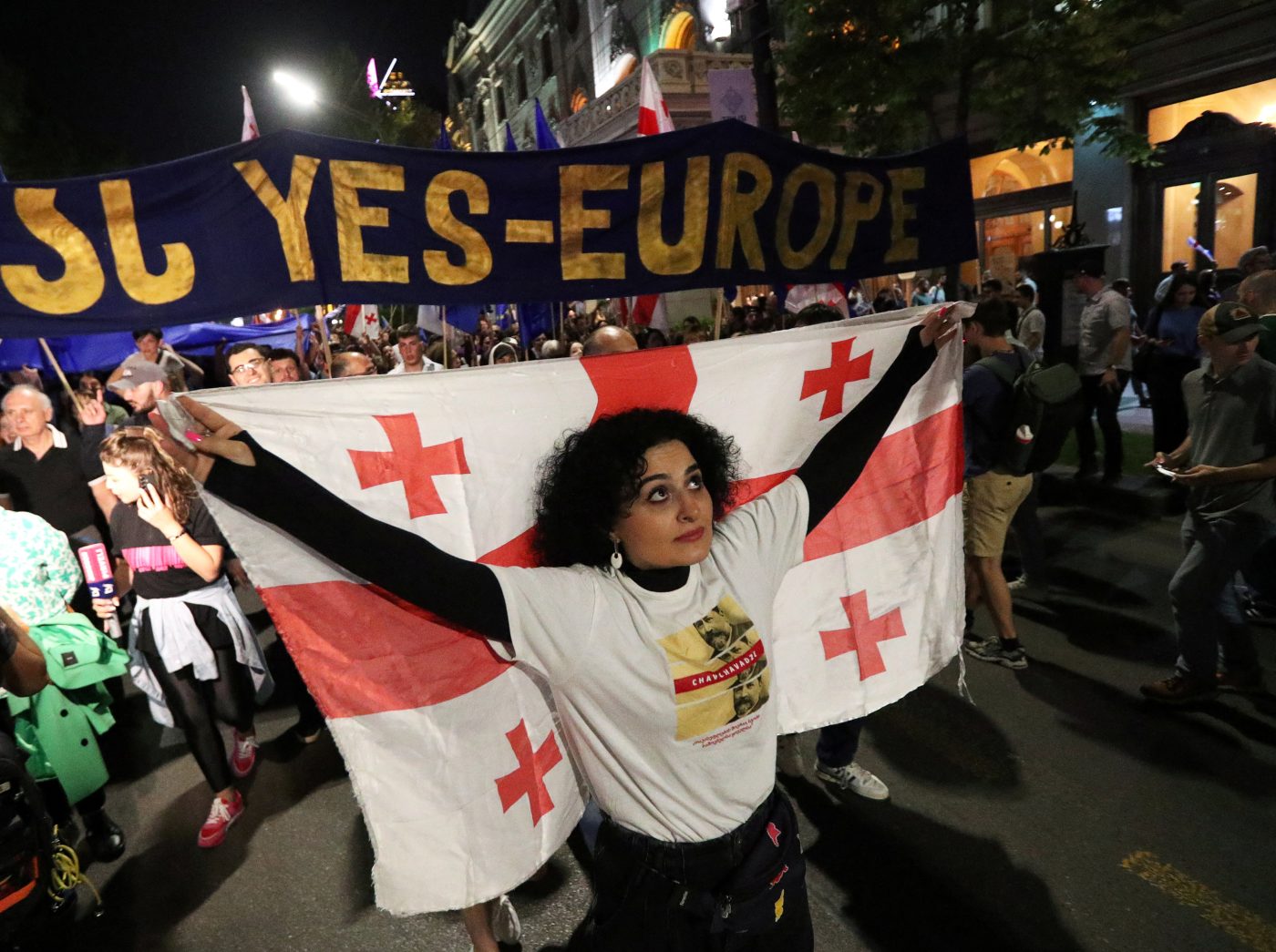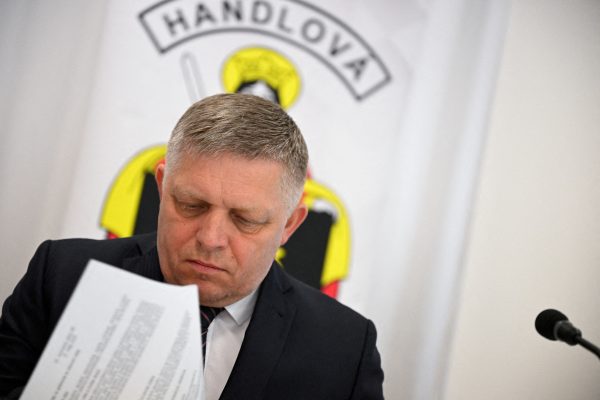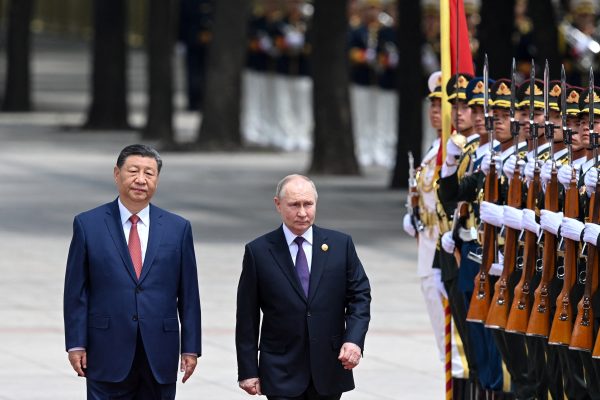Rustaveli Cinema, an imposing Stalinist relic on Tbilisi’s main avenue, which once aired Soviet classics such as Farewell America and The Vow, now lies empty and decrepit. Its windows are plastered with EU and NATO flags and its doors are covered with advertisements selling the European dream.
It is a powerful symbol both of the anti-Moscow fever that is now endemic in Georgia, and the changing face of Russian influence in the country of Stalin’s birth. The Soviet Union’s grand propaganda generator lies empty, its rotting shell used only to imagine an independent future.
With Russia occupying one-fifth of their country since 2008, many Georgians see membership of the European Union (EU) and NATO as the ultimate goals for national security. Some 86% support EU accession, in direct opposition to the sitting government’s Kremlin-friendly approach.
Walking around Tbilisi’s meandering backstreets, a sense of desperation can be felt etched onto its walls, be they adorned with paintings of NATO, EU, and Georgian flags or more explicit graffiti that decries Vladimir Putin as a war criminal. A desire for Western protection from Russia pulses through the city.
This need has been exacerbated massively by the war in Ukraine, as Georgia finds itself in a similar predicament, with Moscow continuing to hold the country a geopolitical hostage. Polling from late last year showed 89% of Georgians believe their country is targeted by Russian aggression or soon will be.
That’s partly because Russia stationed forces in the occupied Georgian regions of South Ossetia and Abkhazia, which formed the basis of a short but bloody five-day war between the two nations in 2008. But it’s also because of Ukraine.
“We feel a great solidarity towards Ukraine here in Georgia,” said Tsira Meskhishvili, a young woman from the mountainous region of Samtskhe–Javakheti, midway between Tbilisi and the Armenian border. “Most people here believe NATO and the European Union could give us safety, a guarantee of security, but unfortunately the situation is changing because of the current government and its negative rhetoric and disinformation.”
Georgia’s government, led by Prime Minister Irakli Kobakhidze and his Georgian Dream party, has ruffled the country’s overwhelmingly pro-EU feathers by re-introducing a controversial bill that would force NGOs, think tanks, media outlets, and campaign groups to declare themselves “foreign agents” if they receive funding from abroad. It would effectively allow the government to brand most of civil society as subversive.
The party’s éminence grise, the billionaire Bidzina Ivanishvili, told crowds on April 29 that NGOs are the catspaws of a global “party of war” that also runs the EU. He promised legal consequences after the election.
Just one day earlier, tens of thousands of protesters turned out to oppose the bill, which reached its second reading on April 30 amid pro- and anti-government rallies. The EU has said Georgia will not be allowed to enter the bloc with the legislation in place. Russia has backed the bill.
Demonstrations have continued every night for almost two weeks, with protesters focusing their anger on what they call a Russian-inspired move. That sense has been reinforced by legislation to restrict the LGBT+ community, sparking anger from human rights groups and again bringing suggestions that the Kremlin playbook is being translated into Georgian.
These developments are only the tip of the government’s anti-EU rhetoric.
“There has always been a positive attitude towards the EU and NATO,” Tsira said. “But right now in Georgia, distorted information about the West is strong.”
Disinformation from Kobakhidze’s government has included attempts to blame NATO for starting the war in Ukraine, scare stories about the negative effects of joining the Eurozone, and claims that Europe would force socially conservative Georgia to implement introduce same-sex marriage.
The People’s Movement, which is affiliated with the ruling party, claims that civil society organizations channel “black money” from the West and seek to trigger a revolution, rhetoric that’s only slightly more lurid than Georgian Dream’s.
The country has been flooded with an influx of Russians since the Ukraine war began, bringing a backlash among the native population. Georgia’s 3.7 million population has swelled by well over 100,000.
While economists say it has been a net positive for Georgia’s national wealth (forecast to reach 4.8% this year after 6.5% growth last year), for most Georgians its effect has been spiraling living costs and even greater hostility toward Moscow. Polling showed 68% wanted Russians banned from entry, and from buying property or starting a business. Meanwhile, the country is increasingly economically dependent on Russia.
As Tbilisi prepares itself for a fall parliamentary election, the Eurosceptic and pro-Russian government stands at odds with a nation desperate to move out of the shadows of its Soviet past in pursuit of its European dream.
With Georgia’s EU candidacy cemented in December, the upcoming October elections are shaping up to be the most crucial since independence.
The challenge for the victor will be to strike a balance between further integration westward and maintaining relations with Russia, whose presence next door cannot be ignored.
Eanna Mackey is a reporter based in Ireland with a background in geopolitics and economics. He has worked as a freelance on post-conflict stories in both Northern Ireland and Bosnia and Herzegovina, and he was an ICFJ Investigative Fellow in 2024.
Europe’s Edge is CEPA’s online journal covering critical topics on the foreign policy docket across Europe and North America. All opinions are those of the author and do not necessarily represent the position or views of the institutions they represent or the Center for European Policy Analysis.





